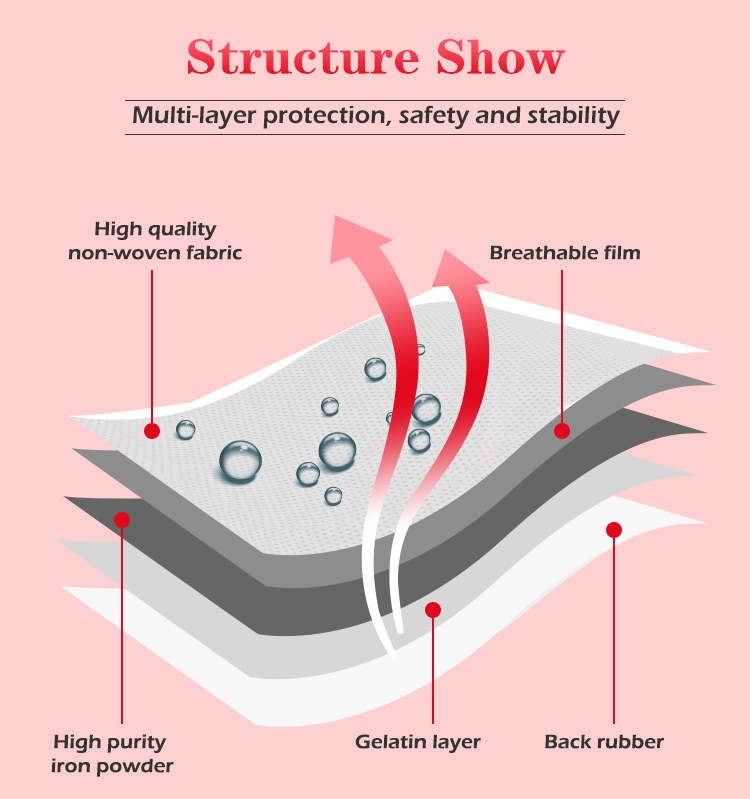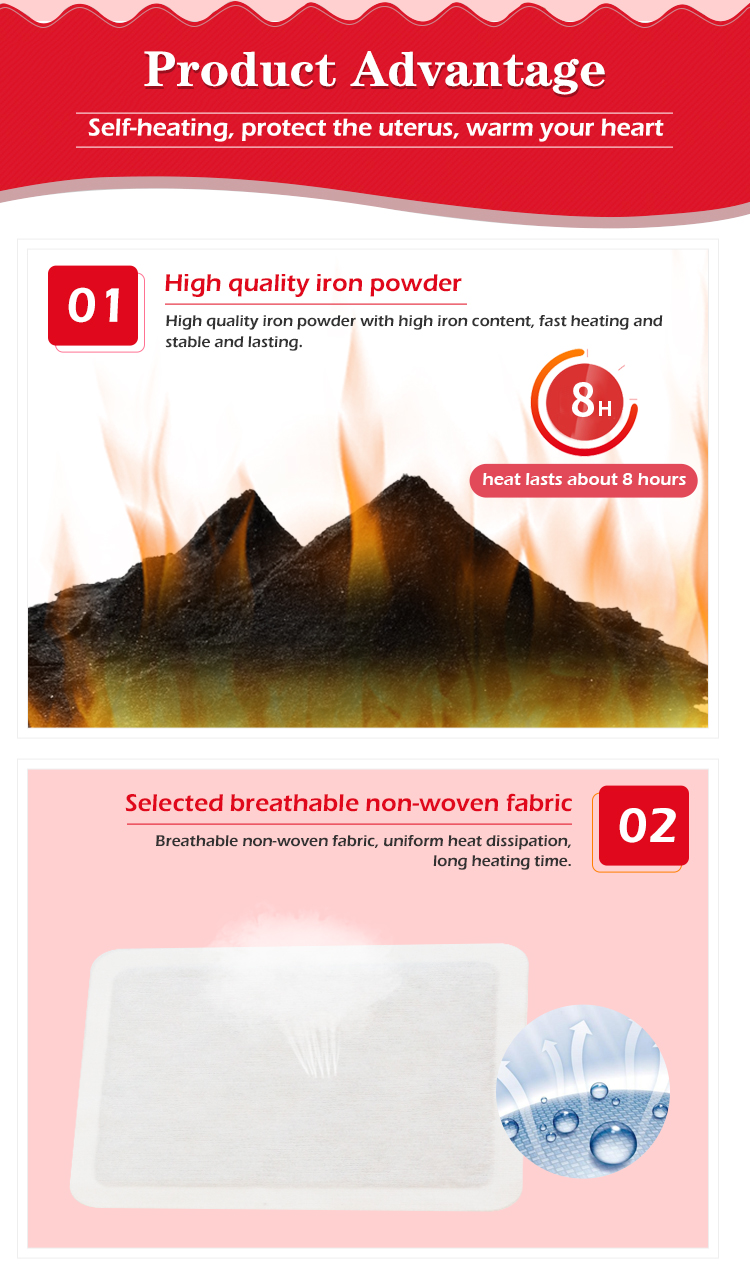How Can B2B Buyers Ensure Quality When Working with a Deep Heat Patches Manufacturer?
When it comes to selecting a supplier for deep heat patches, quality assurance is a critical factor for B2B buyers. Businesses, whether they are looking to add deep heat patches to their wellness programs, retail lineups, or private label offerings, need to ensure that the manufacturer they choose is capable of delivering consistent, high-quality products. Ensuring quality involves a careful review of the manufacturer's processes, certifications, reputation, and transparency in materials and methods. This article explores key strategies B2B buyers can use to guarantee quality when partnering with a Deep Heat Patches Manufacturer, Deep Heat Patches OEM, or a Private Label Deep Heat Patches Supplier.

1. Evaluate the Manufacturer’s Production Standards and Certifications
One of the most direct ways to assess a Deep Heat Patches Manufacturer’s commitment to quality is to review their certifications and production standards. High-quality manufacturers typically follow industry-recognized standards for quality assurance, safety, and environmental practices.
A. ISO and GMP Certifications
Look for manufacturers with ISO (International Organization for Standardization) and GMP (Good Manufacturing Practices) certifications. These certifications confirm that the manufacturer follows strict standards in production, quality control, and sanitation, ensuring a reliable and safe product. Working with a Deep Heat Patches OEM that adheres to these standards means the patches will consistently meet high quality and safety benchmarks.
B. Third-Party Testing and Quality Control Measures
Reputable manufacturers conduct third-party testing to validate product efficacy and safety. A Deep Heat Patches Supplier that invests in independent testing shows a commitment to transparency and quality. Third-party labs can assess the consistency of active ingredients, adherence to regulatory guidelines, and overall product performance.
C. Material Sourcing and Ingredient Transparency
Top manufacturers openly disclose their sourcing practices and ingredient choices. B2B buyers should confirm that the Custom Deep Heat Patches they source contain safe, tested ingredients. Asking about sourcing ensures the manufacturer does not cut corners by using subpar or untested materials, which could compromise product quality.
2. Assess the Manufacturer’s Quality Control and Inspection Processes
A reliable quality control system is essential in every production phase, from raw material sourcing to the final inspection. Quality control processes indicate the manufacturer’s dedication to delivering products that meet expected standards.
A. In-Process Quality Checks
High-quality Deep Heat Patches Manufacturers perform in-process checks during each production stage, such as ingredient mixing, formulation, patch application, and packaging. These checkpoints allow manufacturers to detect and address issues early, reducing the risk of defective products.
B. End-of-Line Inspections
End-of-line inspections ensure that finished products meet the desired specifications for size, thickness, heating duration, and packaging integrity. B2B buyers should ask their Private Label Deep Heat Patches manufacturer for detailed reports on their inspection procedures to confirm consistent quality standards.
C. Batch Testing and Retention Samples
Manufacturers should perform batch testing to validate product efficacy and maintain a reserve of samples for future testing if issues arise. Batch testing also enables manufacturers to pinpoint production inconsistencies and continuously improve quality. Retention samples are particularly useful in validating past batches, ensuring accountability and transparency.
3. Investigate the Manufacturer’s Track Record and Reputation
Understanding a manufacturer’s history and reputation in the market can provide insight into their reliability and quality consistency. Buyers should seek manufacturers with positive feedback, strong industry relationships, and a proven track record of producing Custom Deep Heat Patches.
A. Client Testimonials and Case Studies
Requesting case studies or client testimonials can give B2B buyers an understanding of how other companies have benefitted from working with the Deep Heat Patches Supplier. Many suppliers have case studies on private label deep heat patches, showing their ability to meet client needs in quality, branding, and product specifications.
B. Online Reviews and Industry Standing
Researching a manufacturer’s online reviews and standing within the industry can provide unbiased feedback about their reliability and product quality. Look for mentions of consistency, prompt issue resolution, and responsiveness in fulfilling custom orders for Private Label Deep Heat Patches.
C. References from Other B2B Buyers
Asking for references from other B2B clients offers valuable firsthand insights into the Deep Heat Patches Manufacturer’s quality, communication, and problem-solving abilities. References can help verify the manufacturer’s commitment to maintaining high standards and addressing customer needs.
4. Understand the Manufacturer’s Customization Capabilities
B2B buyers often require specific customization in their deep heat patches to meet the unique demands of their target markets. Ensuring the manufacturer can customize products without compromising quality is key for brand alignment and product effectiveness.
A. Options for Ingredient Customization
When looking for Custom Deep Heat Patches, it’s important to ask about options for ingredient customization, such as heating agents, pain relief additives, and adhesive quality. A flexible Deep Heat Patches OEM can work with clients to create custom formulations that provide the desired effects, catering to specific end-user needs.
B. Private Labeling and Branding Opportunities
For B2B buyers looking to establish their own brand, Private Label Deep Heat Patches offer a valuable opportunity. A good Deep Heat Patches Supplier should provide options for branding, packaging, and label design to meet the buyer’s branding guidelines. Private labeling adds value and uniqueness to the product, helping to distinguish it in competitive markets.
C. Packaging Customization for Shelf Appeal and Usability
Packaging not only affects how a product looks but also influences consumer perception of quality. Ask if the Deep Heat Patches Manufacturer offers customizable packaging options, as this can play a major role in consumer experience, product appeal, and brand consistency. Well-designed packaging enhances the user experience, improving product retention.
5. Establish Clear Quality Assurance Agreements
Clear and documented agreements on quality standards, including specifications for ingredients, packaging, and batch consistency, help protect B2B buyers and maintain transparency with the Deep Heat Patches Manufacturer. Formalizing these expectations in a contract ensures accountability.
A. Establishing Product Specifications and Tolerances
Product specifications should cover size, heating duration, active ingredient concentrations, adhesive quality, and packaging standards. Including these specifics in the quality assurance agreement ensures the manufacturer understands and adheres to the desired criteria, reducing the likelihood of misunderstandings and errors.
B. Creating a Clear Quality Control and Recall Protocol
In the event that a batch does not meet agreed standards, a clear recall protocol should be in place to manage the situation efficiently. This includes steps for identifying, removing, and replacing faulty products. A proactive Deep Heat Patches Supplier will have clear policies for handling recalls and providing replacements.
C. Regular Quality Audits
Regular quality audits, whether conducted by the buyer or an independent third-party, offer an added layer of assurance. These audits can verify that the Deep Heat Patches OEM adheres to high standards and follows agreed-upon processes. Audits also encourage continuous improvement in quality control practices.
6. Collaborate and Maintain Open Communication with the Manufacturer
Effective communication between the B2B buyer and Deep Heat Patches Supplier is essential for a successful partnership. Open channels of communication allow both parties to address any issues quickly and make adjustments as needed to maintain quality.
A. Dedicated Point of Contact
A dedicated contact person or account manager can streamline communications and ensure consistency in all interactions with the Deep Heat Patches Manufacturer. This allows for easier updates, faster issue resolution, and more efficient collaboration.
B. Frequent Updates and Product Development Consultations
Frequent updates help buyers stay informed about production progress, any potential issues, and new customization options. B2B buyers should feel comfortable asking for status updates or initiating conversations around product development, allowing them to adapt to market demands and refine product specifications as needed.
Conclusion
Ensuring quality when working with a Deep Heat Patches Manufacturer or OEM is essential for B2B buyers aiming to deliver safe, effective, and reliable products. By focusing on the manufacturer’s certifications, quality control processes, reputation, customization capabilities, and clear quality agreements, buyers can make informed decisions and foster strong, successful partnerships. Selecting a Deep Heat Patches Supplier with high standards of transparency, accountability, and flexibility ultimately ensures that the final product aligns with the buyer’s quality expectations and brand identity.
Related Questions and Answers
1. What certifications should a Deep Heat Patches Manufacturer have?
- Look for ISO and GMP certifications, as they demonstrate adherence to high production and quality control standards.
2. How can B2B buyers verify a manufacturer’s quality control practices?
- Inquire about in-process checks, end-of-line inspections, and third-party testing to confirm thorough quality assurance practices.
3. Can Custom Deep Heat Patches be tailored to specific needs?
- Yes, a reputable Deep Heat Patches OEM can customize ingredients, heating duration, and packaging to meet unique buyer requirements.
4. Why is third-party testing important for quality assurance?
- Third-party testing ensures unbiased verification of product safety and efficacy, strengthening trust in the manufacturer’s quality.
5. What should be included in a quality assurance agreement with a manufacturer?
- Product specifications, quality control protocols, batch testing requirements, and recall procedures should all be documented to ensure accountability.
By carefully vetting a Deep Heat Patches Supplier, B2B buyers can confidently offer high-quality products that meet their customers' expectations, supporting both brand reputation and long-term success in the market.






